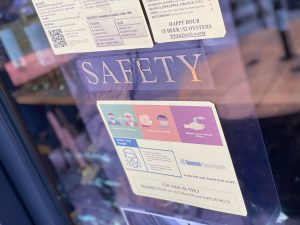Table for two, proof of vaccination
Table for two, proof of vaccination

Proof of vaccination required
By Irish Mae Silvestre
The Philippine Reporter
Ontarians are slowly regaining their pre-pandemic social lives. For those venturing to new restaurants and old haunts, lining up to provide proof of vaccination – as well as a table – has become par for the course.
While every stage of reopening has been welcomed in this hard-hit industry, what has it been like for restaurant owners who have to enforce vaccine mandates?
The first few days weren’t without its hiccups, according to Mariel Buenaventura, co-owner and general manager of iSLAS Filipino BBQ and Bar on Queen Street West.
“On the day it was implemented, our first guest didn’t have proof of vaccination, her phone died, and she was so hungry,” she recalled. “Prior to opening, we already anticipated that the exact same incident might occur so we created a QR code where we can easily access the COVID-19 vaccination portal website. We help our dine-in customers download their vaccine passports and send it to their email for future use.”
With restaurants facing staffing shortages, the extra step has added another challenge.
“We can tell that it creates a little hassle for our customers, and we always explain in a nice manner why we need to comply,” said Buenaventura. “Adding these protocols to our day-to-day operation affects our front-of-the-house flow efficiency considering we’re short-staffed. But we understand that it’s for the safety of everybody: our customers, staff and our whole operation.”
Casa Manila owner Mila Nabor-Cuachon said that in a restaurant where food delivery drivers are also coming to the door, checking people’s IDs and vaccination proof is very labour intensive.
“It does create more work again for restaurants and restaurants are bearing the brunt,” she said. “[However,] I will do it because my husband and I feel [we should do] whatever it takes to beat this pandemic and get everyone healthy.”
No Proof, No Entry?
But what happens when customers can’t provide proof of vaccination? Most of the time, it’s a matter of simply seating them outdoors.
“Some of our customers understand that they have to stay in our front patio if they don’t have a COVID-19 vaccine passport,” said Buenaventura.
However, in some cases it can cost the restaurants much more.
Cuachon said that they’ve had to turn down a couple of tables because one person in the group wasn’t vaccinated.
“The weather wasn’t permitting to eat outside,” she recalled. “That’s a shame especially when it’s a group of 10.”
But Cuachon said that it’s not just about politely turning people away; it can also mean losing out on hosting several larger events.
“Vaccine proofing is definitely making it difficult for people to have a gathering so they might choose to have it at home,” she said. “You’re free to have an unvaccinated person as a guest. That might be business lost.”
Keeping Up with the Rules
On October 22, Christine Elliott, Deputy Premier and Minister of Health, announced that more restrictions will be lifted.
“Effective October 25, Ontario will lift capacity limits in the vast majority of settings where proof of vaccination is required, including in restaurants, bars, gyms and indoor meeting and event spaces,” she said.
“At the same time, other settings will be permitted to lift capacity limits if they choose to opt in to require proof of vaccination.”
She added, “If the situation is not deteriorating, and in the absence of concerning trends, on January 17, 2022, there would begin a gradual lifting of vaccine certification requirements, chief medical officer directives and capacity limits where proof of vaccination is not required.”
With the rapidly changing rules, Cuachon said that they recently started working with a human resources company to ensure that the restaurant is COVID-19 compliant.
The company has also been helpful in helping them navigate the grey areas.
“We get all the latest information from them and if I have any questions like what happens when I have a guest [who has only been] vaccinated once?” she said. “What about a guest who’s unvaccinated but willing to take a test 72 hours before?”
And in addition to mandatory employee handbooks for reference, staff members must now be trained to prevent the spread of COVID-19.
“That’s a very big reason why we took on an HR company to represent us and to make sure we’re always updated, and the training compliances are done,” said Cuachon.
Likewise, Buenaventura admits to being anxious about new announcements.
“We are a little scared whenever there’s a new rule coming out and how it will affect our dine-in customer and foot traffic, but it is better than nothing,” she said. “The lockdown phase was the hardest and [we’re] hoping it won’t happen again.”
Comments (0)